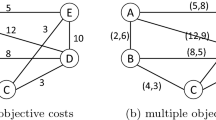Abstract
Combinatorial optimization is one of the main research areas in Evolutionary Computing and Operational Research, and the Travelling Salesman Problem one of their most popular problems. The never ending quest of researchers for new and more difficult combinatorial problems to stress their evolutionary algorithms leads to investigate how to measure the difficulty of Travelling Salesman Problem instances. By developing methodologies for separating ease from difficult instances, researchers will be confident about the performance of their algorithms. In this proof-of-concept, a methodology for evaluating the difficulty of instances of the Travelling Salesman Problem in the nearby of the optimal solution is proposed. This methodology is based on the use of Random Walk to explore the closeness area of the optimal solution. Instances with a more pronounced gradient towards the optimal solution might be considered easier than instances exhibiting almost a null gradient. The exploration of this gradient is done by starting from the optimal tour and later modifying it with a Random Walk process. The aim is to propose a methodology to evaluate the difficulty of instances of Travelling Salesman Problem, which can be applied to other combinatorial-problems instances. As a consequence of this work, a methodology to evaluate the difficulty of Travelling Salesman Problem instances is proposed and confronted to a wide set of instances, and finally a rank of their difficulty is stated.
Access this chapter
Tax calculation will be finalised at checkout
Purchases are for personal use only
Similar content being viewed by others
References
Blum, C.: Hybrid metaheuristics in combinatorial optimization: a tutorial. In: Dediu, A.-H., Martín-Vide, C., Truthe, B. (eds.) TPNC 2012. LNCS, vol. 7505, pp. 1–10. Springer, Heidelberg (2012)
Gutin, G., Punnen, A.P. (eds.): The Traveling Salesman Problem and Its Variations. Combinatorial Optimization. Kluwer Academic, Dordrecht (2002)
Applegate, D.L., Bixby, R.E., Chvatal, V., Cook, W.J.: The Traveling Salesman Problem: A Computational Study. Princeton Series in Applied Mathematics. Princeton University Press, Princeton (2007)
Garey, M.R., Johnson, D.S.: Computers and Intractability: A Guide to the Theory of NP-Completeness. W. H. Freeman, San Francisco (1979)
Lin, S.: Computer solutions of the traveling salesman problem. Bell Syst. Tech. J. 44(10), 2245–2269 (1965)
Smith-Miles, K., van Hemert, J., Lim, X.Y.: Understanding TSP difficulty by learning from evolved instances. In: Blum, C., Battiti, R. (eds.) LION 4. LNCS, vol. 6073, pp. 266–280. Springer, Heidelberg (2010)
Lin, S., Kernighan, B.W.: An effective heuristic algorithm for the travelling-salesman problem. Oper. Res. 21, 498–516 (1973)
Applegate, D., Cook, W.J., Rohe, A.: Chained lin-kernighan for large traveling salesman problems. INFORMS J. Comput. 15(1), 82–92 (2003)
Johnson, D.S., McGeoch, L.A.: Experimental Analysis of Heuristics for the STSP. Wiley, New York (2001)
Gent, I.P., Walsh, T.: The TSP phase transition. Artif. Intell. 88(1–2), 349–358 (1996)
Smith-Miles, K., Lopes, L.: Measuring instance difficulty for combinatorial optimization problems. Comput. OR 39(5), 875–889 (2012)
Matsumoto, M., Nishimura, T.: Mersenne twister: a 623-dimensionally equidistributed uniform pseudorandom number generator. ACM Trans. Model. Comput. Simul. 8(1), 3–30 (1999)
Acknowledgement
The research leading to these results has received funding by the Spanish Ministry of Economy and Competitiveness (MINECO) for funding support through the grant FPA2013-47804-C2-1-R, and “Unidad de Excelencia María de Maeztu”: CIEMAT - FÍSICA DE PARTÍCULAS through the grant MDM-2015-0509.
Author information
Authors and Affiliations
Corresponding author
Editor information
Editors and Affiliations
Rights and permissions
Copyright information
© 2016 Springer International Publishing Switzerland
About this paper
Cite this paper
Cárdenas-Montes, M. (2016). Evaluating the Difficulty of Instances of the Travelling Salesman Problem in the Nearby of the Optimal Solution Based on Random Walk Exploration. In: Martínez-Álvarez, F., Troncoso, A., Quintián, H., Corchado, E. (eds) Hybrid Artificial Intelligent Systems. HAIS 2016. Lecture Notes in Computer Science(), vol 9648. Springer, Cham. https://doi.org/10.1007/978-3-319-32034-2_25
Download citation
DOI: https://doi.org/10.1007/978-3-319-32034-2_25
Published:
Publisher Name: Springer, Cham
Print ISBN: 978-3-319-32033-5
Online ISBN: 978-3-319-32034-2
eBook Packages: Computer ScienceComputer Science (R0)




